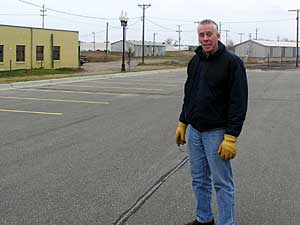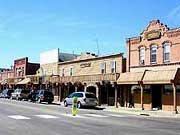 |
| Downtown Bemidji business owner Mike Smith stands near the site of a proposed $35 million community events center. The site is currently surrounded by old warehouses and vacant lots. Getting that facility built is one of 17 goals established by a new organization called Bemidji Leads. (MPR photo/Tom Robertson) |
A survey conducted last year showed Bemidji area residents worry their community's small-town feel is slipping away. Only 35 percent thought the town had a clear vision for the future. Now, a group of local leaders is using an innovative new model to create a common vision for Bemidji. The group is called Bemidji Leads. Their work is designed to put the community back in control of its destiny.
Bemidji, Minn. — It happens all over the country. Small towns strive to get bigger but in doing so, they sometimes sacrifice their small town charm and are overrun by parking lots, fast food joints and retail giants. Communities that were once unique find themselves looking like a thousand other towns.
Jim Benson, former Bemidji State University president, serves on the local economic development commission. Bensen noticed that was beginning to happen in Bemidji.
"I was personally watching a lot of this going on, where the bulldozer came out first. We put up a big box or a strip mall, and put concrete and a shrub out front and said that's progress," said Bensen. "And a lot of people were saying, 'Wow, I would rather have this place look more like Itasca State Park 40 years from now, than the face of most development that you see in big cities and suburbs.'"
Two years ago, Bensen and others decided to do something about it. They looked at successful community development models in places like Tupelo, Mississippi and Scottsdale, Arizona. Then they put together their own model.
"We decided we would use a concept that Joseph Campbell, the philosopher, says," Bensen said. "You either claim your destiny, or it will claim you. In other words, go out and decide what you want to be and do that, or otherwise, you're reacting to what you get."
That sort of pie-in-the-sky talk about destiny, vision and values isn't unusual. But planning of that nature is typically done by just a handful of people in city council chambers, county board rooms or commission meetings.
Bensen and others decided their approach would be different. They would listen to the wishes and dreams of local residents. They invited the entire community to come on board for an effort they call Bemidji Leads. They made it clear that it wasn't a committee, or a task force or a commission. Instead, this would be a cross-section of people who care about their community.
|
Bemidji Leads has allowed this community to dream again... I would suggest the best thing Bemidji Leads has done to date is create an environment where people in the community can feel like they can have an impact.
- Dave Hengel
|
For the next year and a half, about 25 people, the stewards of Bemidji Leads, simply listened. They developed a comprehensive, communitywide survey. It asked people what they liked and disliked about Bemidji and what they wanted the town to be in 20 years. They asked the same questions at open houses, in coffee shops and at more than 40 community meetings.
What emerged was a single statement. It says that Bemidji's residents want it to be a successful regional center, that protects its small town beauty and character. With that came a list of 17 goals, or what the group calls destiny drivers.
They are intentionally daunting, audacious goals, real head-turners. One calls for the city to plant 10,000 trees each year for a decade. Two Rotary clubs and some other groups latched on to that one right away. Nearly 30,000 trees have already been planted.
Another top goal would dramatically change the look of a few city blocks at the edge of downtown Bemidji. Right now it's a desolate stretch of property, with a few faded warehouses and vacant lots. But if the Bemidji Leads group has its way, this will be the site of a $35 million events center within three years.
It's an idea that's failed three times since the 1990s. Voters rejected it in 2001, and before that, it didn't even get support from the city council.
Downtown business owner Mike Smith, standing near the site, says this time is different. He says the Bemidji Leads organization has created a wave of momentum.
"We're looking at the potential site for the new Bemidji events center, community events center," said Smith. "And it's going to encompass quite an area down here."
The proposed center would be home to Bemidji State University's Division 1 hockey team. It would be a big boost to a struggling downtown, drawing people in for concerts, conventions and other events.
But the plan has a long way to go. Supporters will need the state's help to pay for it, and they'll need voters next fall to approve a local sales tax. Smith says that's more likely to happen now. He credits the Bemidji Leads organization with uniting the community behind its goals.
"I think it's really pushing the community," said Smith. "And I think that's what all these things are about. One of my favorite sayings is, for many years, we've let development drive the plan, and I think it's time to turn it around and let the plan drive the development."
What's happening in Bemidji is unique, according to regional economic developers. Dave Hengel works for the Headwaters Regional Development Commission, an organization that promotes growth in five counties in northwest Minnesota. Hengel says Bemidji's destiny statement and future goals came not from a board room, but from the people. He says Bemidji is reinventing the way rural communities approach their future.
"I don't know of another community that I deal with, nor in Minnesota, that has one clear destiny statement that says, 'This is where we're headed as a community,'" said Hengel. "You may think it's a no-brainer and something like that should be common. I would suggest it isn't."
Hengel says the key to Bemidji's success is its ability to bring together broadbased community stewardship that crosses geographic and political boundaries. He says it's also about getting people involved.
"Somewhere along the line we allowed people to sit on the sidelines in civic involvement," said Hengel. "And so it's a matter of telling folks, the expectation is you're not going to sit on the sidelines anymore. Get in the game."
Some of the community's goals seem a bit out of reach. One goal, for example, would put the local hospital among the top 100 in the nation by 2010. Another says Bemidji will have the lowest incidence of drug and alcohol abuse in the state within 10 years. And there's also a goal to connect Bemidji and the Twin Cities with a four-lane highway.
Supporters say Bemidji's goals are no different than the one President John F. Kennedy set, when he said the U.S. would put a man on the moon. That statement galvanized the nation.
Dave Hengel says Bemidji's goals are focusing the community toward success. He says there's nothing wrong with shooting for the moon.
"Bemidji Leads has allowed this community to dream again," Hengel said, "and to think we can do things in the community to improve ourselves. And so I would suggest the best thing Bemidji Leads has done to date is create an environment where people in the community can feel like they can have an impact, and challenge them to act on it."
Hengel says the Bemidji Leads model is spreading. Similar efforts are underway in Park Rapids, as well as in Mahnomen County and on the White Earth Indian Reservation.
The Headwaters Regional Development Commission is planning to promote the idea throughout the rest of Minnesota and beyond within the next three years.






